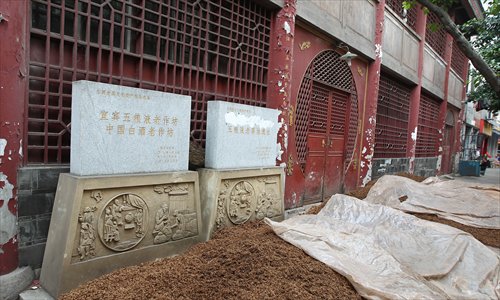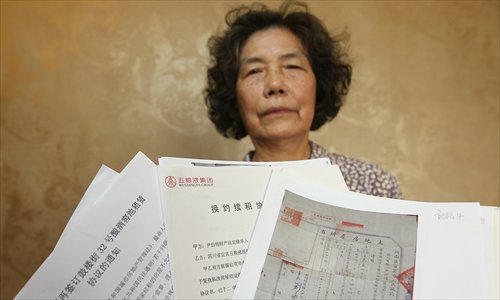Heartened by legal reform, family acts to reclaim centuries-old liquor pits from State company

The entrance to the pits is dilapidated. Photo: Cui Meng/GT

Yin Xiaogong holds up documents that she says demonstrate the pits belong to the family. Photo: Cui Meng/GT
After years of failed attempts, the Yins, a family that once made baijiu in Yibin, Sichuan Province, successfully filed a lawsuit earlier this month against the State-owned Wuliangye Group, accusing it of seizing 16 Ming Dynasty pits which the Yins said they had previously leased to the company. The case, valued at over 300 million yuan ($18,587,400), is the biggest in years which involves which involves the distinction between State property and private property.
For decades, the State-owned Wuliangye Group, one of China's biggest and most popular baijiu companies, has prided itself on the 16 Ming Dynasty (1368-1644) fermentation pits that it uses to produce its baijiu. The manufacturer of high-end spirits based in Yibin, Sichuan Province features the earthen pits in company profiles and promotion videos, calling them an important cultural relic and the secret behind the distinct aroma of its signature baijiu, favored by China's wealthy and corporate elites.
But the group never mentions the Yin family, who ran a baijiu business in Yibin from the days of the Ming Dynasty up until the 1950s, when their descendants quit the baijiu business and leased their pits - those featured in Wuliangye's advertisements - to the State company.
The Yins claim they were unambiguously the legal owners of the pits until the end of 2009, when the Wuliangye Group abruptly cancelled its lease agreement but refused to move its workers out of the pits. In 2010, to the shock of the Yins, the Yibin local government announced that the pits now belonged to the State.
"We don't understand. The lease clearly states that the pits were leased from us to the Wuliangye Group. How can it suddenly became State property?" Yin Xiaogong, a retired teacher and a member of the Yin family, asked.
State versus private
From June 2010, six members of the Yin family, headed by the then 70-year-old Yin Xiaogong, filed three lawsuits against the Wuliangye Group and the Yibin government at Sichuan's high court, accusing them of seizing the pits that should have been private property. The high court dismissed the lawsuits at the time, refusing to hear them, and arguing that the conflict is a "historical issue."
Just as the Yins were about to lose hope, a twist came this year when the Supreme People's Court reformed the system by which courts decide to accept cases. Previously, China's courts could avoid hearing troublesome cases by reviewing filing documents and refusing cases without offering any specific reason. Starting from May 1, a new system of "case registration" allows cases to be put on courts' dockets before they are reviewed, making it much easier for cases to be heard in China.
On May 4, the first working day after the new regulations were implemented, Yin Xiaogong and her lawyers brought the case against Wuliangye Group to Sichuan's high court. The high court's response came on the same day, when it agreed to hear the case. The first hearing will be held on June 25, according to Li Daoyan, a lawyer representing the Yins. Critics say this will be a testing ground for how the government treats cases related to State assets and private assets.
"For the Wuliangye Group and Yibin's local governments, this is a battle for State-owned assets. For the Yin family, however, the 16 pits have always been their private property," Li told the Global Times.
The vicissitudes of history
Tucked away on an old Yibin street, the 16 earthen pits are considered to be the oldest fermentation pits in China that are still in use. And for nearly 650 years, apart from short breaks imposed by war and political unrest, the aromatic baijiu steam in the room that housed the pits has never cooled.
Traditional baijiu distillers believe that the older the pits, the better the baijiu, and only pits with a history of over 100 years can develop the thick patina of bacteria and fungus that aids the fermentation and improves the character of the alcohol. With an over 600-year-long history of continuous fermenting, the pits are almost priceless, and their unique place in Sichuan's baijiu manufacturing culture has earned them a place in the National Museum of China, which collected a piece of mud taken from the pits in 2005.
For many, it's a miracle that the Yins managed to secure ownership of the historical pits despite the political tumult that modern China has gone through. In the 1950s, millions of private businesses and companies, from family businesses that had lasted for generations to street vendors, from struggling companies to cash cows, were transformed under the socialist ownership system. According to Yibin's local chronicles, by the end of 1956, of the 2,373 private businesses in the city, 2,344, or 98.8 percent, were transferred to public ownership.
The Yins' business was among the remaining 29. Yin Xiaogong said this was because the Yins were not engaged in the management of the pit at that time - her father had a position in the government and had no time to manage the pits. As a result, they rented the pits and the surrounding factory building to the Wuliangye Group, back then called State-owned No.24 Baijiu Company.
Then in 1958, during another wave of socialist transformation, the government, in a campaign that ordered private house owners to hand over their houses for public rental, took over the pits and the surrounding factory buildings. The Yins received 12 yuan of rent each month from the government.
The ownership of the facilities was further blurred during the Cultural Revolution (1966-76). During that period, the government no longer paid the family any rent, and Yin Boming, the father of Yin Xiaogong, was attacked politically and died as a result of the turmoil.
All these political difficulties came to an end in 1984, at least this was how it seemed. That year, in an effort to correct the mistakes made during the Cultural Revolution, the local government issued a document to them, returning the ownership of the pits to them.
In 1993, the Wuliangye Group signed a 5-year lease with the Yins, and paid the Yins 45,774 yuan as a compensation for the rent that was unpaid between 1985 to 1992 and renewed its contract with the Yin's. The contract has been renewed four times since then, and the last one lasted until 2009.
An invalid document
Over 20 years later, the 1984 document became a critical piece of evidence when the family sought to prove their ownership of the pits. In response to their claim, however, the current Yibin government declared the document invalid, saying it was a mistake for the government to issue such a notice in the 1980s and that the pits belonged to Wuliangye.
In 1995, Wuliangye Group bought the factory buildings that surround the pits from the Yins. It now argues that the pits were an accessory to the factory buildings, and should share ownership with them. But the Yins refuted the claims with the lease, saying that if the ownership had changed hands decades ago, it would be unreasonable for the company to continue renting the pits.
In 2010, the board of the Wuliangye Group said it will no longer publish any information about the pits, and that since it is State asset at the center of the dispute, the district and city governments will take care of it.
On May 20, the company released a notice saying it had received the Yins' complaint and will actively engage in the lawsuit to protect its shareholders' interests. When the Global Times called the Wuliangye Group for a response to the Yins' accusation, the man who answered the phone hung up immediately.
"Yibin's local government thinks that they can seize whatever property that belongs to its people, and that everything belongs to the State. They think [the Yins] should consider themselves lucky that their property wasn't seized during the land reform or the campaign to transform capitalist industries to socialist ownership," Chen Youxi, lawyer for the Yins, said in a television interview.
"In the age of the rule of law, we should use the Civil Law and the Property Law to deal with the dispute, rather than referring to previous national policies [from the 1950s to the 1970s]," he said.
Experts say that there's a deep-rooted belief that State-owned assets and private assets in China should not be treated equally.
"State-owned assets are historically regarded as 'sacred and inviolable' in China. If an individual seizes State-owned property, he could face severe legal punishment and public denouncement. However, when a government organization seizes private property and the victim files a lawsuit, such cases are often not even heard," Hu Xingdou, professor of economics at the Beijing Institute of Technology, said.
The 2004 amendments to China's Constitution were seen as a breakthrough in acknowledging the importance of private assets, as they marked the first time that the private assets of Chinese citizens were put on an equal footing with public property, both of which are "inviolable."
But Hu said China still has a long way to go to fully protect private property rights.
"While the country's recent emphasis on the rule of law might see improvement in this regard, the actual change will definitely be a long undertaking," Hu said.
The case might be a touchstone to test the government's determination. Li Daoyan, the lawyer, said the fact that the Wuliangye Group is the major taxpayer in Yibin could be the biggest difficulty in the case from the point of view of the Yins.
Yin Xiaogong said throughout history, her family had always been patriotic, with many family members being Communists and helping the Communist Party of China in the 1920s with their savings from their family business.
"We love the Party and we love our country. And we expect the latest legal reform will bring us justice," she said.
Newspaper headline: Private property pitfalls